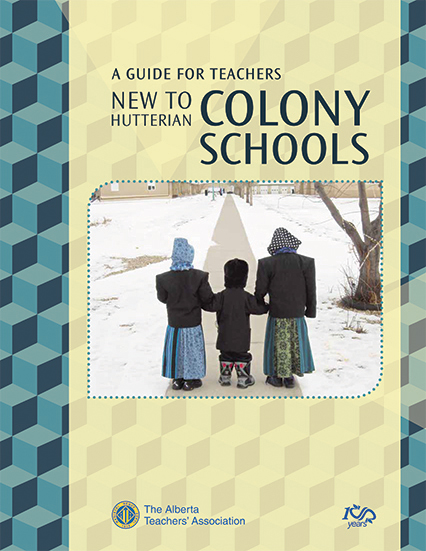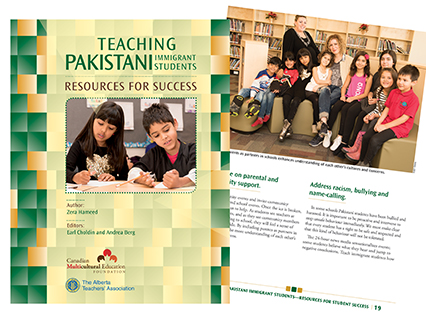Page Content
Colony schools a unique setting
Vanda Rufli was the lone teacher at her Hutterite colony school. She brought her own chalk and her own toilet paper. She didn’t have a phone or a photocopier. She also didn’t have a choice.
She was a first-year teacher, and positions were scarce. Her employing board wanted to keep her, and the colonyschool position was the only one available.
“Then, I loved it. Then, I stayed,” said Rufli, who has spent 26 years of her 29-year teaching career with colony schools and is a professional development facilitator with the Alberta Teachers’ Association. 
Rufli is also one of five dedicated and experienced Alberta colony teachers and principals who contributed time and expertise to the creation of a new resource geared to helping teachers new to the world of Hutterite colony schools.
Recently published by the Alberta Teachers’ Association, A Guide for Teachers New to Hutterian Colony Schools specifically addresses the needs of teachers new to Hutterite colony teaching. Its intent is to assist colony teachers in their practice and help them make a seamless transition to teaching in what is a very unique setting.
The resource provides an understanding of the Hutterian culture and the distinct complexities of the colony teacher’s role and responsibilities. It also shares advice gleaned from Rufli and her colleagues, representing new and seasoned perspectives.
“The teaching experience is second to none,” Rufli said.
She noted that the lack of access to technology is a growing challenge, and then shared what she believed to be the best aspect of colony teaching.
“The personal relationships that you develop with the kids … the ones that you have taught for a couple of years, four years or five years, whatever — you actually develop personal relationships with those kids. You understand them much better and you’re actually able to meet their needs better,” she said.
About Hutterite colony schools
- They are public schools supported by public school districts.
- 250 certificated teachers teach at 182 colony schools in Alberta.
- Schools are one-room facilities located on colony property.
- Students are English as a second language speakers (German is their first language) and range from kindergarten to Grade 10.
- Most colonies do not allow the use of technology in school.
|
Insight into Pakistani culture

If you’re a classroom teacher or school administrator who’s looking to better understand the culture and needs of Pakistani immigrant students in your school, the Alberta Teachers’ Association has a new resource aimed at helping you.
Entitled Teaching Pakistani Immigrant Students, the Association’s recent publication provides background information on the history, beliefs, customs and values of Pakistani people and provides suggestions on how teachers and administrators can have positive interactions with Pakistani families.
“They are a very popular, highly requested document,” said executive staff officer Andrea Berg.
As secretary of the Association’s Diversity, Equity and Human Rights Committee, Berg acted as co-editor of the book project, which was produced in partnership with the Canadian Multicultural Education Foundation.
The tips contained in the booklet come from teachers who either are of Pakistani descent or who have worked extensively with people from that culture.
Among the information provided in the book are sample forms, with Urdu translations, to help school officials prepare for an initial meeting with parents and establish healthy working relationships.
“That’s really key and helpful for the teachers to have something that they can give to the parents,” Berg said.
Each school in Alberta received one copy of the resource through the ATA’s October school mailing. Additional copies are available for free upon request.
The new resource is a response to the changing demographics occurring in Alberta schools and is part of a series that has already produced booklets focused on students of Somali, South Sudanese, Karen and Arab heritage. Due for release early in the new year are resources focused on Filipino students and those from central Africa.
Want a copy?
Digital copies of these resources are available for free on the Association’s website at www.teachers.ab.ca by clicking on For Members > Professional Development > Diversity, Equity & Human Rights > Resources.
Hard copies can be ordered by contacting Barb Bossert at barb.bossert@ata.ab.ca or by calling 1-800-232-7208.
Workshop available
The Association also offers a workshop entitled Promoting the Success of Immigrant Students, which provides participants with the opportunity to strengthen their cultural awareness and competence, deepen their understanding of the challenges faced by immigrant families, and learn classroom and schoolwide strategies for working with immigrant students and their parents.
The workshop can be booked by contacting the ATA’s Professional Development program area.
Phone: 780-447-9485 in Edmonton; 1-800-232-7208,
ext. 485, elsewhere in Alberta
Email: pdworkshops@ata.ab.ca
|
